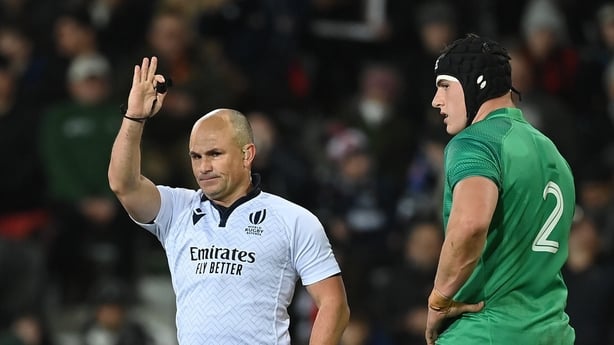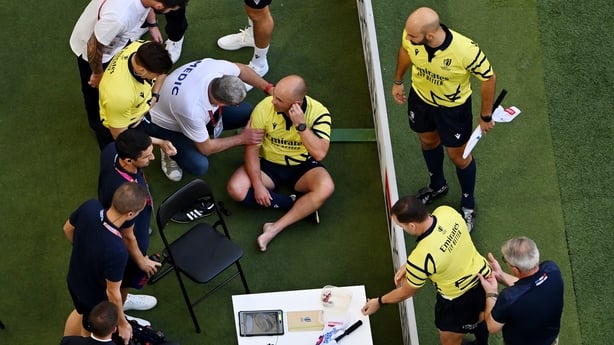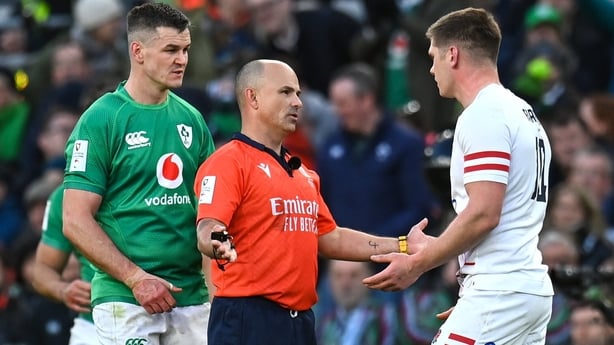While Jerry Flannery and Tony Brown are the high-profile additions to the South Africa coaching ticket in 2024, another important appointment has come in under the radar.
Former international referee Jaco Peyper, who retired following the World Cup due to a persistent Achilles issue, thought he was out of the game before being pulled back in to work as part of the senior South African coaching team as a 'Laws and Discipline Advisor'.
He isn't the first referee to to go from poacher to gamekeeper, with French rugby setting the initial trend. In 2021, Jerome Garces made a surprising retirement announcement to join the French coaching staff as their laws advisor, while another former ref, Romain Poite, has also been working with Top14 sides.
Coaching teams have become more specialised in recent seasons, with plenty of teams employing coaches for specifics like contact skills, scrummaging, ball skills and breakdown work. As such, it pays to have a referee's perspective in camp on a daily basis.
"It has been quite a turnaround, but I guess when rugby is in your blood, it is hard to stay away," Peyper says of sideways move into retirement.
"A few months ago, I had a meeting with my wife and we agreed that we were done with rugby. Two weeks later we have to go to the same restaurant, another bottle of wine and I had to explain to her that I am back into rugby," he laughs.

And the South African explains the nature of his new role.
"We never plan to not concede penalties, we plan to avoid avoidable penalties. If you take part in the game you are going to conceded penalties somewhere.
"We class them in one, or two or three categories. Like I say it is a developing science, it's a job that is going to develop and get more detailed as we go."
While officially part of the coaching team, Peyper has often been working alongside the Springbok coaches. In his previous role as a referee employed by the South Africa Rugby Union, he would often be called in to ref training matches in camp, just as the likes of Andy Brace or Frank Murphy would do so for the IRFU, to give the players and coaches feedback on their approach to discipline.
But Peyper believes this new appointment extends beyond just the national side.
"The first brief is something that we started last year before the World Cup campaign when I spent a bit of time with the team and the coaching staff asked me what could we fix, and I said we need to build a respect piece, around refereeing in this country and not just for this team but also around refereeing in this country.

"We need more referees, and we need people to serve the game. We have to create a different environment so that is the first part of the brief.
"The second part is that these fellas [the coaches] have to coach within the key areas, accurately so my job is not to judge the refereeing performance, my job is to make sure that these fellas coach within the key focus. Then that those fellas [players] play and execute within those areas.
"Obviously after games there will be alignment, whether we should adjust after games or whether the referees will adjust," he added.
Saturday's first Test between Ireland and South Africa in Pretoria will also see World Rugby's new trial laws debuted, with a stricter approach to offsides around the kicking game, and the removal of the scrum option from free-kicks.
Additionally, Peyper revealed that the two teams have agreed to trial a new Television Match Official protocol, which will allow the TMO to intervene in real-time to alert the referee to issues like an obvious knock-on, or a clear foot in touch, rather than spending time officially referring an incident to the TMO.

"We all recognise we have to do something, so we have to have data and trials. Be innovative.
"Maybe after this series we'll say 'that's not the way', but we've tested it and Ireland was willing to let us innovate.
"If you don't know the protocol, it takes you back to the last attacking possession excluding set-piece stuff, in the past was only two phases, which gives the television match official a chance in real-time to look at something.
"So, if there's a clear knock-on, a clear foot in touch, you don't have to let it play out until it's a try and then go for a big referral based on facts, they have to have factual proof so they can just stop the officials and go back.
"Hopefully, that'll speed up the process," he added.
Listen to the RTÉ Rugby podcast on Apple Podcasts, Spotify or wherever you get your podcasts.
Listen to live commentary of South Africa v Ireland (4pm) on Saturday Sport on RTÉ Radio 1, and follow a live blog on rte.ie/sport and the RTÉ News app.


